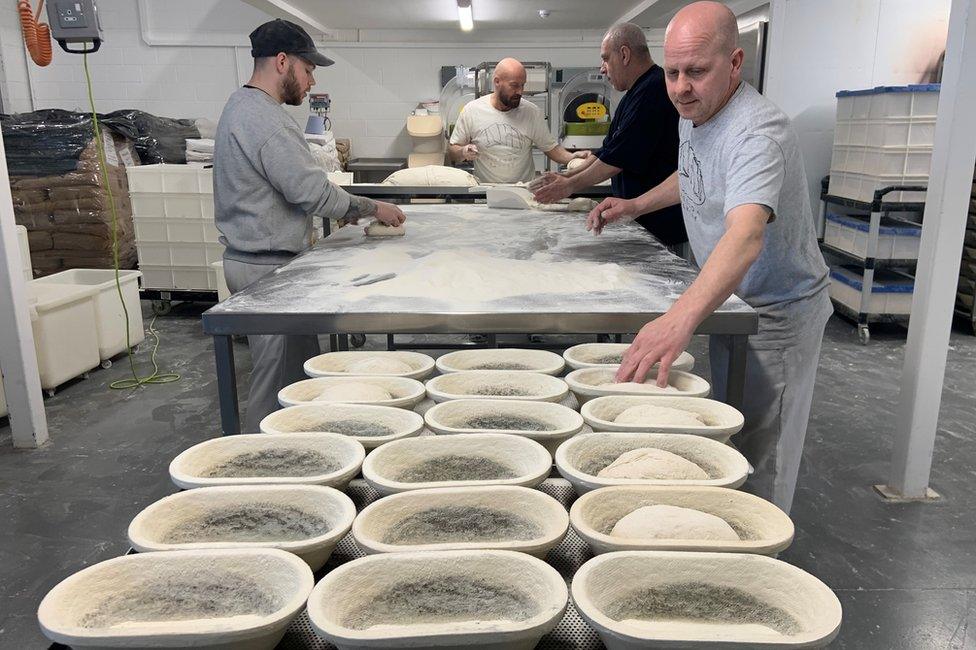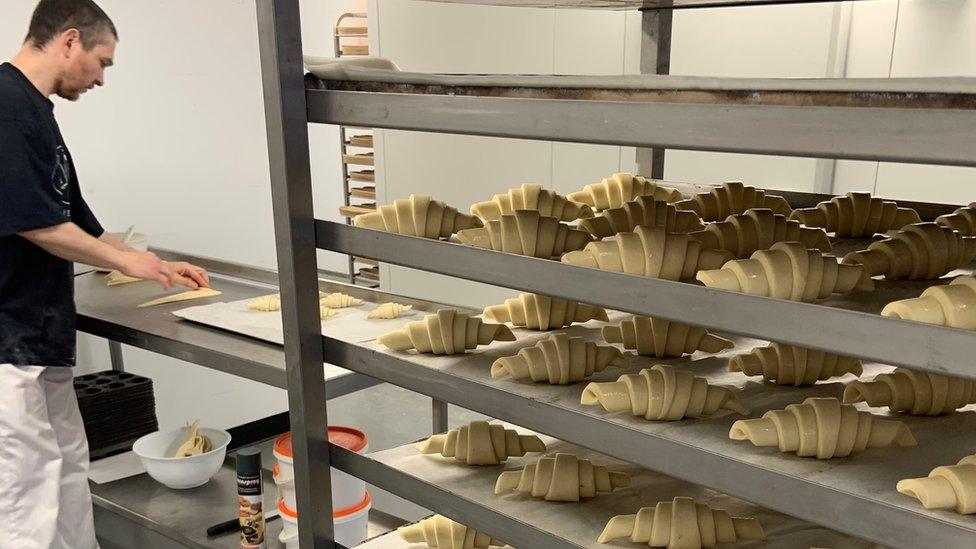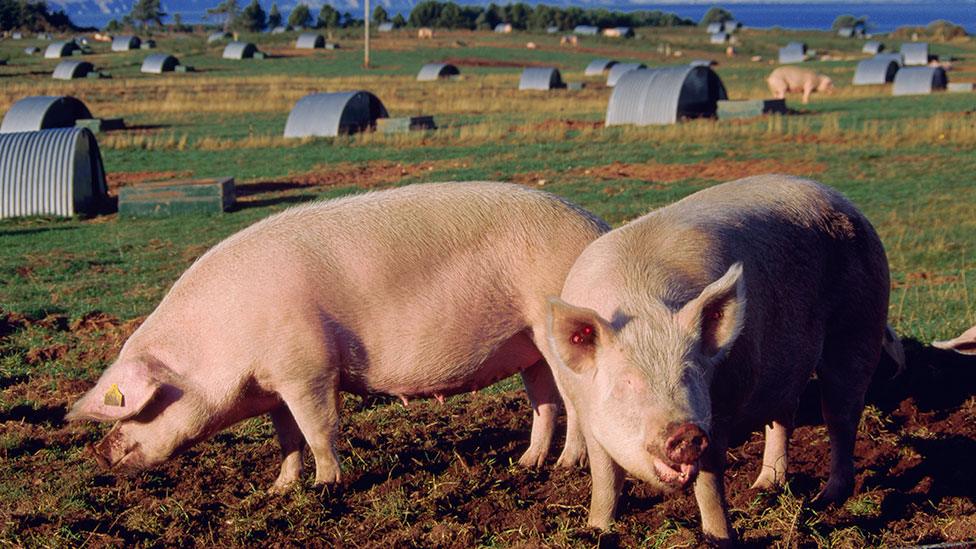A loaf of bread meets global inflation
- Published

The cost of living continues to soar, with prices rising by 7% in the 12 months to March - their fastest rate for 30 years
Businesses in every sector face rising costs of materials, energy, wages and payroll tax, and have to gauge how much they can afford to pass on to customers, as incomes are squeezed
Inflation is rising worldwide, driven by energy and food costs. The latest global food price index shows very sharp increases in grains and cooking oils as a result of war in Ukraine
The latest forecast for world output and world trade is sharply reduced, due to the war and supply disruption from continuing Covid lockdowns, with a warning that it is the poorest who will bear the brunt of higher food prices.
It's merely a loaf of bread - a staple of life and of sharing around the world, with few ingredients and produced close to the consumer.
But at an industrial unit in the north of Glasgow, in the shadow of Royston high-rise towers, Freedom Bakery makes it more than merely bread. "How it's made is as important as what it is," says company founder and managing director Matt Fountain.
These are serious loaves for high-end customers, in restaurants and independent food stores where they can retail for more than £4 each. They're produced by this social enterprise with a commitment to helping rehabilitate offenders. Six of the current 15 workers were taken on as they reached the end of prison sentences, and three more come on day release from Barlinnie.
Most of the staff are qualified bakers. But Matt Fountain warns of "degrading" skills, since Brexit cut off access to European recruits. He advertised a vacancy a month ago, which has brought four applicants, none of them from Britain. Although a 4am start is not to everyone's liking, he says the pay is good.
With costs weighing heavily on the bakery business, this graduate of art history - who set up Freedom Bakery seven years ago, having observed that he's not cut out for a conventional career - needs more people if he is to grow the business to a level where it can sustain its overheads.
The increased costs are daunting. Fountain lists them: flour up 24% in the past year, forcing him to look beyond his Lothian mill supplier; butter for his croissants is up 20%; nuts, mainly walnuts, up 80%, the same rise as electricity to power the ovens, with a bill equivalent to 90 average households; the wage bill is up 10% including the hike in employer National Insurance contributions; diesel for his three vans is up 35%, and rent just rose 12%.
Last month, he reluctantly put up his prices by 6.7% - close to the average rate of price increase across the economy. Fountain says it would be "immoral" to raise them again this year, even though input cost inflation continues.

He says his job is to flex the business in ways that absorb the costs, and is quietly very angry at government for failing to constrain the rising cost of energy, and failing to understand how supply chains work.
"It's very difficult," he says. "Looking back even five years, how much we took for granted as manufacturers. It's not only the rising costs: it's even getting goods supplied, with delays in deliveries and shipping.
"And while we fixate on a supply crisis in goods and materials, what we experience in our industry is a supply crisis in people. They predominantly came from Europe, but haven't stayed here, so there's a real shortage in the market."
War blockages
Freedom Bakery is just one example of almost every business that is currently facing a wide range of rising costs, while gauging the capacity or willingness of customers to absorb higher prices when household income is rising at a significantly slower pace.
Prices rose by 7% in the 12 months to March, according to the latest inflation figures from the Office for National Statistics - that's their fastest rate for 30 years and up from 6.2% in February.
The British economy has never seen such a slowdown in real income or buying power, at least in modern times. And in a city where the public sector plays such a prominent role, that gap between rising income and faster-rising prices is all the more of a challenge.
But to help understand the local and the national challenges of tackling inflation, there is also a global challenge. It is illustrated in the monthly food price index recently published by the United Nations Food and Agriculture Organisation (FAO)., external
This tracks prices in a basket of globally-traded food commodities, and the FAO reports a rise of more than 12.6% between February and March, as one of the world's biggest grain and fertilizer exporters invaded another.

Russia and Ukraine are major suppliers of wheat
Since March last year, that index is up 33.6%. The cereal price index was up 17% in one month, largely as a result of war in Ukraine. Russia and Ukraine together accounted for around 30% of wheat exporters in the past three years, and 20% of maize.
Wheat prices were up nearly 20% over the past month, also hit by worries about crop conditions in the USA. Maize was up 19.1% in one month, and in common with barley and sorghum, that means record prices.
Pig shortage
Ukraine has been the world's biggest exporter of sunflower oil, and the price index for vegetable oils was up 23%.
British edible oil importers are among those finding that new contracts for supplying sunflower oil have evaporated, so they're looking for alternatives, and palm, soy and rapeseed are all up in price worldwide.
Far from the war zone, rice production is in a happier position, with prices 10% below the level last year.
Other foodstuffs in the FAO shopping basket show less dramatic price increases. But sugar stands 20% higher than a year ago and dairy is up nearly 24%.
Meat was up nearly 5% between February and March, partly due to a shortage of pigs ready for slaughter in western Europe and avian flu affecting poultry.
For food prices over the coming year, the FAO has better news. Even allowing for a sharp drop in production from Ukraine, total wheat production is expected to rise this year, and both Ukraine and Russia are expected to add to grain stocks while there are export blockages.
'Critical juncture'
A further measure of the impact of war on the global economy has just been published by the World Trade Organisation (WTO). With Ukraine's output expected to decline by more than 45% this year, the Russian Federation is on course for a 7.9% hit to output this year, says the WTO, even though energy exports are expected to grow nearly 5%.
Traded goods around the world are being hit by further Covid lockdowns in China, notably in the exporting hub of Shanghai. That contributes to a downgraded WTO forecast for trade, from 4.7% to 3%.

Meat prices have risen, partly due to a shortage of pigs read for slaughter
The UK plays a small and disappointing role in this. Coming out of the worst of the Covid downturn, other countries saw trade recovery strongly. Post-Brexit Britain did not.
The UK government's deliberate decision to choose a form of Brexit that makes trade with the European Union more difficult and expensive has had an inevitable consequence - of less trade with Europe, and no compensating uplift in trade with the rest of the world.
The disruption of trade in foodstuff is seen as threatening the poorest most. According to WTO director-general Ngozi Okonjo-Iweala: "The war in Ukraine has created immense human suffering, but it has also damaged the global economy at a critical juncture. Its impact will be felt around the world, particularly in low-income countries, where food accounts for a large fraction of household spending.
"Smaller supplies and higher prices for food mean that the world's poor could be forced to do without. This must not be allowed to happen. This is not a time to turn inward."
The Nigerian trade leader continues: "History teaches us that dividing the world economy into rival blocs and turning our backs on the poorest countries leads neither to prosperity nor to peace".
Trade in services was up 15% last year, but the WTO expects it to fall this year, including reduced container shipping and passenger air travel.
And after total world output rose 5.7% last year, that is now forecast to slow to only 2.8% growth this year, picking up to 3.2% next year.
However, such forecasters acknowledge huge uncertainties, especially those coming out of the unknowable course of the war in Ukraine.
Related topics
- Published13 April 2022

